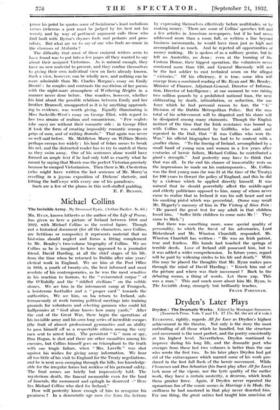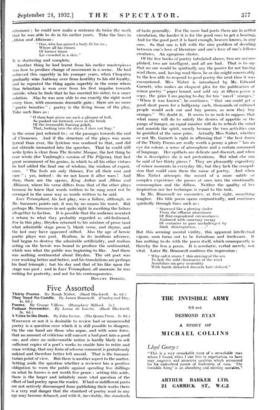Dryden's Later Plays
Dryden : The Dramatic Works. Edited by Montague Summers. . (Nonesuch Press. Vols. V and VI. £7 17s. -6d. the set of 6 vols.) Dryden : The Dramatic Works. Edited by Montague Summers. . (Nonesuch Press. Vols. V and VI. £7 17s. -6d. the set of 6 vols.) EVERYONE, rightly, regards All for Lore as- Dryden's highest- achievement in the theatre. Not only is the story the most enthralling of all those -which he handled, but the structure and movement is the most perfect, and the poetry consistently at his highest level. Nevertheless, Dryden continued to iinproye during his long life, and the dramatic poet who emerges from these last two volumes is better than the one who Wrote the first. two. In hig later' plays Dryden had got rid of the extravagance which marred some of his -Work pro- duced in the first full flush of the heroic movement. While Cleomenes and Don Sebastian (his finest play after All for Love) lack none of the vigour, nor the lyric quality of the earlier work, they have a certain austerity, a decorum, which lends them greater force. Again, if. Dryden never repeated the uproarious fUn of the 'comic scenes in Marriage a la Mode, the swiftness he had mastered in that play never deserted hint. For one thing, the great satires had taught him concision of
utterance; he could now make a sentence do twice the work that he was able to do in his earlier years. Take the lines in
..-11bion and Albianus :
" One, who has gained a body fit for sin ; Where all his crimes Of former times Lie crowded in a skin."
It is shattering and complete.
Another thing he had learnt from his earlier masterpieces was how to-produce change of movement in a scene.: He had
achieved this superbly in his younger years, when Cleopatra :gradUally wins Anthony over from hostility to his old loyalty, and he repeated the thing again:superbly in the scene where Don SebaStittit is won over from his first impulse towards suicide, when he finds that he has married his sister, to a saner solution. Also he was now able to use exactly the right word every time, with enormous dramatip gain ; there are no more poetic beauties " ; poetry is the living tissue of the play. 'Take such lines as ":0' thou haat given Me such a glimpse of hell, So pushed me forward, even to the brink Of the irremeable burning gulph, That, looking into the abyss, I dare not leap." -
in the scene just, referred to ; or the passages towards the end Of Cleomene. s. And if the structure of the plays was more
lyrical than ever, the lyricism was confuted to that, and did not obtrude unwanted into the speeches. That he could still
write lyrics is clear from The Secular. Masque, the last thing he ever wrote (for Vaabrugh's version of The Pilgrim), that last great monument of his genius, in which to all his other virtues he had added the final one of wisdom, the wisdom of experi- ence. " The fools are only thinner, For all their cost and
care " ; yes, indeed : do we not know it after wars ! And then, there are the operas, King Arthur and Albion and Albianus, where his verse differs front that of the other plays because he knew that words written to be sung must not he arranged in the same way as words written to be said.
Love TritiMphant, his last- play, -was -a failure, although, as Mr. Summers points out, .it was by .no means his worst. But perhaps Mr. Summers in not quite right in ascribing the failure altegether to faction. It is possible that the audience resented a return to what they probably regarded as old-fashioned. For in this play, Dryden returned to his mixture of prose (and what admirable stage prose !), blank verse, and rhyme, and the last may have appeared stilted. Also the age of heroic poetic plays was past. Realism, in its insidious advance, had begun to destroy the admirable artificiality, and realism acting on the heroic was bound to produce the sentimental, which was what the public was beginning to like. And there was nothing sentimental about Dryden. The old poet was ever working better and better, and his translations are perhaps his final triumph ; but his day and that of his like upon the stage was past ; and in Love Triumphant, all unaware, he was writing for posterity, and not for his contemporaries.
BONA MY DOBREE.































 Previous page
Previous page